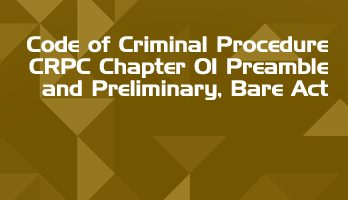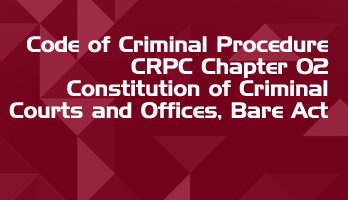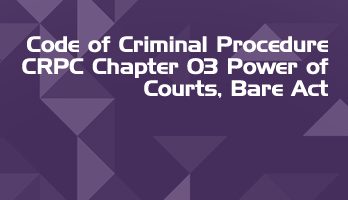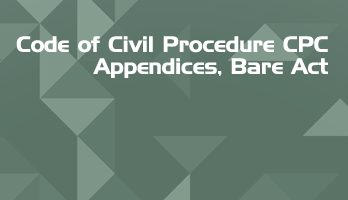Most acts are accompanied by 'subsidiary legislation' such as rules, regulations, notifications and orders; which address the actual implementation detail of the act.
Free Full Course Available on LawMint's YouTube Channel
How to Land Your Dream LLB Internship in a Top Law Firm
- Part 1 - Introduction
- Part 2 - Internship Planning
- Part 3 - Internship Research
- Part 4 - Building Your Profile
- Part 5 - The Email
- Part 6 - The Resume
- Part 7 - The Cover Letter
- Part 8 - The Interview
- Part 9 - Self Development
Practical and comprehensive course, with real examples and step-by-step analysis of the complete internship application process. Check out LawMint's YouTube channel now!
Code of Criminal Procedure, 1973
Chapter 32 – Execution, Suspension, Remission And Commutation Of Sentences
Section 413 – Execution of order passed under section 368
When in a case submitted to the High Court for the confirmation of a sentence of death, the Court of Session receives the order of confirmation or other order of the High Court thereon, it shall cause such order to be carried into effect by issuing a warrant or taking such other steps as may be necessary.
Section 414 – Execution of sentence of death passed by High Court
When a sentence of death is passed by the High Court in appeal or in revision, the Court of Session shall, on receiving the order of the High Court, cause the sentence to be carried into effect by issuing a warrant.
Section 415 – Postponement of execution of sentence of death in case of appeal to Supreme Court
- Where a person is sentenced to death by the High Court and an appeal from its judgment lies to the Supreme Court under sub – clause a) or sub – clause b) of clause (1) of Article 134 of the Constitution, the High Court shall order the execution of the sentence to be postponed until the period allowed for preferring such appeal has expired, or if an appeal is preferred within that period, until such appeal is disposed of.
- Where a sentence of death is passed or confirmed by the High Court, and the person sentenced makes an application to the High Court for the grant of a certificate under Article 132 or under sub – clause c) of clause (1) of Article 134 of the Constitution, the High Court shall order the execution of the sentence to be postponed until such application is disposed of by the High Court, or if a certificate is granted on such application until the period allowed for preferring an appeal to the Supreme Court on such certificate has expired.
- Where a sentence of death is passed or confirmed by the High Court, and the High Court is satisfied that the person sentenced intends to present a petition to the Supreme Court for the grant of special leave to appeal under Article 136 of the Constitution, the High Court shall order the execution of the sentence to be postponed for such period as it considers sufficient to enable him to present such petition.
Section 416 – Postponement of capital sentence on pregnant woman
If a woman sentenced to death is found to be pregnant, the High Court shall commute the sentence to imprisonment for life.
Section 417 – Power to appoint place of imprisonment
- Except when otherwise provided by any law for the time being in force, the State Government may direct in what place any person liable to be imprisoned or committed to custody under this Code shall be confined.
- If any person liable to be imprisoned or committed to custody under this Code is in confinement in a civil jail the Court of Magistrate ordering the imprisonment or committal may direct that the person be removed to a criminal jail.
- When a person is removed to a criminal jail under Sub – Section (2), he shall, on being released therefrom, be sent back to the civil jail, unless either
- three years have elapsed since he was removed to the criminal jail, in which case he shall be deemed to have been released from the civil jail under section 58 of the Code of Civil Procedure, 1908 (5 of 1908) or section 23 of the Provincial Insolvency Act, 1920 (5 of 1920), as the case may be; or
- the Court which ordered his imprisonment in the civil jail has certified to the officer in charge of the criminal jail that he is entitled to be released under section 58 of the Code of Civil Procedure, 1908 (5 of 1908) or under section 23 of the Provincial Insolvency Act, 1920 (5 of 1920), as the case may be.
Section 418 – Execution of sentence of imprisonment
- Where the accused is sentenced to imprisonment for life or to imprisonment for a term in cases other than those provided for by section 413, the Court passing the sentence shall forthwith forward a warrant to the jail or other place in which he is, or is to be, confined, and, unless the accused is already confined in such jail or other place, shall forward him to such jail or other place, with the warrant: Provided that where the accused is sentenced to imprisonment till the rising of the Court, it shall not be necessary to prepare or forward a warrant to a jail and the accused may be confined in such place as the Court may direct.
- Where the accused is not present in Court when he is sentenced to such imprisonment as is mentioned in Sub – Section (1), the Court shall issue a warrant for his arrest for the purpose of forwarding him to the jail or other place in which he is to be confined; and in such case, the sentence shall commence on the date of his arrest.
Section 419 – Direction of warrant for execution
Every warrant for the execution of a sentence of imprisonment shall be directed to the officer in charge of the jail or other place in which the prisoner is, or is to be, confined.
Section 420 – Warrant with whom to be lodged
When the prisoner is to be confined in a jail, the warrant shall be lodged with the Jailor.
Section 421 – Warrant for levy of fine
- When an offender has been sentenced to pay a fine the Court passing the sentence may take action for the recovery of the fine in either or both of the following ways, that is to say, it may
- issue a warrant for the levy of the amount by attachment and sale of any moveable property belonging to the offender;
- issue a warrant to the collector of the district, authorising him to realise the amount as arrears of land revenue from the movable or immovable property, or both of the defaulter: Provided that, if the sentence directs that in default of payment of the fine, the offender shall be imprisoned, and if such offender has undergone the whole of such imprisonment in default, no Court shall issue such warrant unless, for special reasons to be recorded in writing, it considers it necessary so to do, or unless it has made an order for the payment of expenses or compensation out of the fine under section 357.
- The Stale Government may make rules regulating the manner in which warrants under clause (a) of Sub – Section (1) are to be executed, and for the summary determination of any claims made by any person other than the offender in respect of any properly attached in execution of such warrant.
- Where the Court issues a warrant to the Collector under clause (b) of Sub – Section (1), the Collector shall realise the amount in accordance with the law relating to recovery of arrears of land revenue, as if such warrant were a certificate issued under such law: Provided that no such warrant shall be executed by the arrest or detention in prison of the offender.
Section 422 – Effect of such warrant
A warrant issued under clause (a) of Sub – Section (1) of section 421 by any Court may be executed within the local jurisdiction of such Court, and it shall authorise the attachment and sale of any such property outside such jurisdiction, when it is endorsed by the District Magistrate within whose local jurisdiction such property is found.
Section 423 – Warrant for levy of fine issued by a Court in any territory to which this Code does not extend
Notwithstanding anything contained in this Code or in any other law for the time being in force, when an offender has been sentenced to pay a fine by a criminal Court in any territory to which this Code does not extend and the Court passing the sentence issues a warrant to the Collector of a district in the territories to which this Code extends, authorising him to realise the amount as if it were an arrear of land revenue, such warrant shall be deemed to be a warrant issued under clause (b) of Sub – Section (1) of section 421 by a Court in the territories to which this Code extends, and the provisions of Sub – Section (3) of the said section as to the execution of such warrant shall apply accordingly.
Section 424 – Suspension of execution of sentence of imprisonment
- When an offender has been sentenced to fine only and to imprisonment in default of payment of the fine and the fine is not paid forthwith, the Court may
- order that the fine shall be payable either in fully on or before a date not more than thirty days from the date of the order, or in two or three instalments, of which the first shall be payable on or before a date not more than thirty days from the date of the order and the other or others at an interval or at intervals, as the case may be, of not more than thirty days;
- suspend the execution of the sentence of imprisonment and release the offender, on the execution by the offender of a bond, with or without sureties, as the Court thinks fit, conditioned for his appearance before the Court on the date or dates on or before which payment of the fine or the instalment thereof, as the case may be, is to be made; and if the amount of the fine or of any instalment, as the case may be, is not realised on or before the latest date on which it is payable under the order, the Court may direct the sentence of imprisonment to be carried into execution at once.
- The provisions of Sub – Section (1) shall be applicable also in any case in which an order for the payment of money has been made on non – recovery of which imprisonment may be awarded and the money is not paid forthwith; and, if the person against whom the order has been made, on being required to enter into a bond such as is referred to in that Sub – Section, fails to do so, the Court may at once pass sentence of imprisonment.
Section 425 – Who may issue warrant
Every warrant for the execution of a sentence may be issued either by the Judge or Magistrate who passed the sentence, or by his successor – in – officer.
Section 426 – Sentence on escaped convict when to take effect
- When a sentence of death, imprisonment for life or fine is passed under this Code on an escaped convict, such sentence shall, subject to the provisions hereinbefore contained, take effect immediately.
- When a sentence of imprisonment for a term is passed under this Code on an escaped convict,
- if such sentence is severer in kind than the sentence which such convict was undergoing when he escaped, the new sentence shall take effect immediately;
- if such sentence is not severer in kind than the sentence which such convict was undergoing when he escaped, the new sentence shall take effect after he has suffered imprisonment for a further period equal to that which, at the time of his escape, remained unexpired of his former sentence.
- For the purposes of Sub – Section (2), a sentence of rigorous imprisonment shall be deemed to be severer in kind than a sentence of simple imprisonment.
Section 427 – Sentence on offender already sentenced for another offence
- When a person already undergoing a sentence of imprisonment is sentenced on a subsequent conviction to imprisonment or imprisonment for life, such imprisonment or imprisonment for life shall commence at the expiration of the imprisonment to which he has been previously sentenced, unless the Court directs that the subsequent sentence shall run concurrently with such previous sentence: Provided that where a person who has been sentenced to imprisonment by an order under section 122 in default of furnishing security is, whilst undergoing such sentence, sentenced to imprisonment for an offence committed prior to the making of such order, the latter sentence shall commence immediately.
- When a person already undergoing a sentence of imprisonment for life is sentenced on a subsequent conviction to imprisonment for a term or imprisonment for life, the subsequent sentence shall run concurrently with such previous sentence.
Section 428 – Period of detention undergone by the accused to be set off against the sentence of imprisonment
Where an accused person has, on conviction, been sentenced to imprisonment for a term, not being imprisonment in default of payment of fine, the period of detention, if any, undergone by him during the investigation, inquiry or trial of the same case and before the date of such conviction shall be set off against the term of imprisonment imposed on him on such conviction, and the liability of such person to undergo imprisonment on such conviction shall be restricted to the remainder, if any, of the term of imprisonment imposed on him. Provided that in cases referred to in section 433A, such period of detention shall be set off against the period of fourteen years referred to in that section.
Section 429 – Saving
- Nothing in section 426 or section 427 shall be held to excuse any person from any part of the punishment to which he is liable upon his former or subsequent conviction.
- When an award of imprisonment in default of payment of a fine is annexed to a substantive sentence of imprisonment and the person undergoing the sentence is after its execution to undergo a further substantive sentence or further substantive sentences of imprisonment effect shall not be given to the award of imprisonment in default of payment of the fine until the person has undergone the further sentence or sentences.
Section 430 – Return of warrant on execution of sentence
When a sentence has been fully executed, the officer executing it shall return the warrant to the Court from which it is issued, with an endorsement under his hand certifying the manner in which the sentence has been executed.
Section 431 – Money ordered to be paid recoverable as a fine
Any money (other than a fine) payable by virtue of any order made under this Code, and the method of recovery of which is not otherwise expressly provided for, shall be recoverable as if it were a fine: Provided that section 421 shall, in its application to an order under section 359, by virtue of this section, be construed as if in the proviso to Sub – Section (1) of section 421, after the words and figures “under section 357”, the words and figures “or an order for payment of costs under section 359” had been inserted.
Section 432 – Power to suspend or remit sentences
- When any person has been sentenced to punishment for an offence, the appropriate Government may, at any lime, without conditions or upon any conditions which the person sentenced accepts, suspend the execution of his sentence or remit the whole or any part of the punishment to which he has been sentenced.
- Whenever an application is made to the appropriate Government for the suspension or remission of a sentence, the appropriate Government may require the presiding Judge of the Court before or by which the conviction was had or confirmed, to state his opinion as to whether the application should be granted or refused, together with his reasons for such opinion and also to forward with the statement of such opinion a certified copy of the record of the trial or of such record thereof as exists.
- If any condition on which a sentence has been suspended or remitted is, in the opinion of the appropriate Government, not fulfilled, the appropriate Government may cancel the suspension or remission, and thereupon the person in whose favour the sentence has been suspended or remitted may, if at large, be arrested by any police officer, without warrant and remanded to undergo the unexpired portion of the sentence.
- The condition on which a sentence is suspended or remitted under this section may be one to be fulfilled by the person in whose favour the sentence is suspended or remitted, or one independent of his will.
- The appropriate Government may, by general rules or special orders, give directions as to the suspension of sentences and the conditions on which petitions should be presented and dealt with: Provided that in the case of any sentence (other than a sentence of fine) passed on a male person above the age of eighteen years, no such petition by the person sentenced or by any other person on his behalf shall be entertained, unless the person sentenced is in jail, and,
- where such petition is made by the person sentenced, it is presented through the officer in charge of the jail; or
- where such petition is made by any other person, it contains a declaration that the person sentenced is in jail.
- The provisions of the above Sub – Sections shall also apply to any order passed by a Criminal Court under any section of this Code or of any other law which restricts the liberty of any person or imposes any liability upon him or his properly.
- In this section and in section 433, the expression “appropriate Government” means,
- in cases where the sentence is for an offence against, or the order referred to in Sub – Section (6) is passed under, any law relating to a matter to which the executive power of the Union extends, the Central Government;
- in other cases the Government of the State within which the offender is sentenced or the said order is passed.
Section 433 – Power to commute sentence
The appropriate Government may, without the consent of the person sentenced commute
- a sentence of death, for any other punishment provided by the Indian Penal Code (45 of 1860);
- a sentence of imprisonment for life, for imprisonment for a term not exceeding fourteen years or for fine;
- a sentence of rigorous imprisonment for simple imprisonment for any term to which that person might have been sentenced, or for fine;
- a sentence of simple imprisonment, for fine.
Section 433A – Restriction on powers of remission or commutation in certain cases
Notwithstanding anything contained in section 432, where a sentence of imprisonment for life is imposed on conviction of a person for an offence for which death is one of the punishment provided by laws or where a sentence of death imposed on a person has been commuted under section 433 into one of imprisonment for life, such person shall not be released from prison unless he had served at least fourteen years of imprisonment.
Section 434 – Concurrent power of Central Government in case of death sentences
The powers conferred by sections 432 and 433 upon the State Government may, in the case of sentences of death, also be exercised by the Central Government.
Section 435 – State Government to act after consultation with Central Government in certain cases
- The powers conferred by sections 432 and 433 upon the State Government to remit or commute a sentence, in any case where the sentence is for an offence
- which was investigated by the Delhi Special Police Establishment constituted under the Delhi Special Police Establishment Act, 1946 (25 of 1946), or by any other agency empowered to make investigation into an offence under any Central Act other than this Code, or
- which involved the misappropriation or destruction of, or damage to, any property belonging to the Central Government, or
- which was committed by a person in the service of the Central Government, while acting or purporting to act in the discharge of his official duty. shall not be exercised by the State Government except after consultation with the Central Government.
- No order of suspension, remission or commutation of sentences passed by the State Government in relation to a person, who has been convicted of offences, some of which relate to matters to which the executive power of the Union extends, and who has been sentenced to separate terms of imprisonment which are to run concurrently, shall have effect unless an order for the suspension, remission or commutation, as the case may be, of such sentences has also been made by the Central Government in relation to the offences committed by such person with regard to matters to which the executive power of the Union extends.
Important Central Acts in Regional Languages
Legislative department website also features regional language versions of several important Central Acts.
Free Full Course Available on LawMint's YouTube Channel
How to Land Your Dream LLB Internship in a Top Law Firm
- Part 1 - Introduction
- Part 2 - Internship Planning
- Part 3 - Internship Research
- Part 4 - Building Your Profile
- Part 5 - The Email
- Part 6 - The Resume
- Part 7 - The Cover Letter
- Part 8 - The Interview
- Part 9 - Self Development
Practical and comprehensive course, with real examples and step-by-step analysis of the complete internship application process. Check out LawMint's YouTube channel now!












